A Brief Colonial History Of Ceylon(SriLanka)
Sri Lanka: One Island Two Nations
A Brief Colonial History Of Ceylon(SriLanka)
Sri Lanka: One Island Two Nations
(Full Story)
Search This Blog
Back to 500BC.
==========================
Thiranjala Weerasinghe sj.- One Island Two Nations
?????????????????????????????????????????????????Friday, May 1, 2020
Portrait of a crisis: Asylum seekers in south Tel Aviv facing coronavirus
The spread of COVID-19 has left asylum seekers in Israel out of work, crammed into uninhabitable apartments with exorbitant rents, and desperate for government assistance.
 ByOren ZivApril 30, 2020
ByOren ZivApril 30, 2020
Since the beginning of the coronavirus crisis in Israel, the plight of African asylum seekers, who are not entitled to assistance from the Israeli government, has been amplified. Even before the outbreak — in the absence of a supporting family or savings, and under the shadow of the so-called “deposit law,” which since 2017 has docked 20 percent of asylum seekers’ salaries — their situation was not easy.
Earlier this month, an independent survey published by a committee of Eritrean asylum seekers in Israel revealed that 50 percent of Eritrean asylum seekers are in need of financial assistance, and more than 40 percent are unable to pay rent.
The past two months have seen countless families moving into one-bedroom apartments together. These are families in which both parents have lost their jobs and are living at home with their children, or who are only able to survive because of the assistance they receive from non-profit organizations and private citizens.
The asylum seeker community has been praising the High Court’s decision last Thursday to strike down the deposit law. Several people told me that if not for the restrictions, they would be out celebrating in the streets.
Asylum seekers working in food distribution and other essential jobs since the beginning of the crisis hope that once their deposit is released, they will be able to focus on helping families in need. Those who get their deposit back may even be able to help friends and family who have lost their jobs.
Despite the High Court decision, it will take at least a month for some asylum seekers to start getting their money back, and it is unclear how long the process will take. Meanwhile, the non-profit groups that support the asylum seeker community are continuing their solidarity activities for the many in need.
‘We have to be strong’
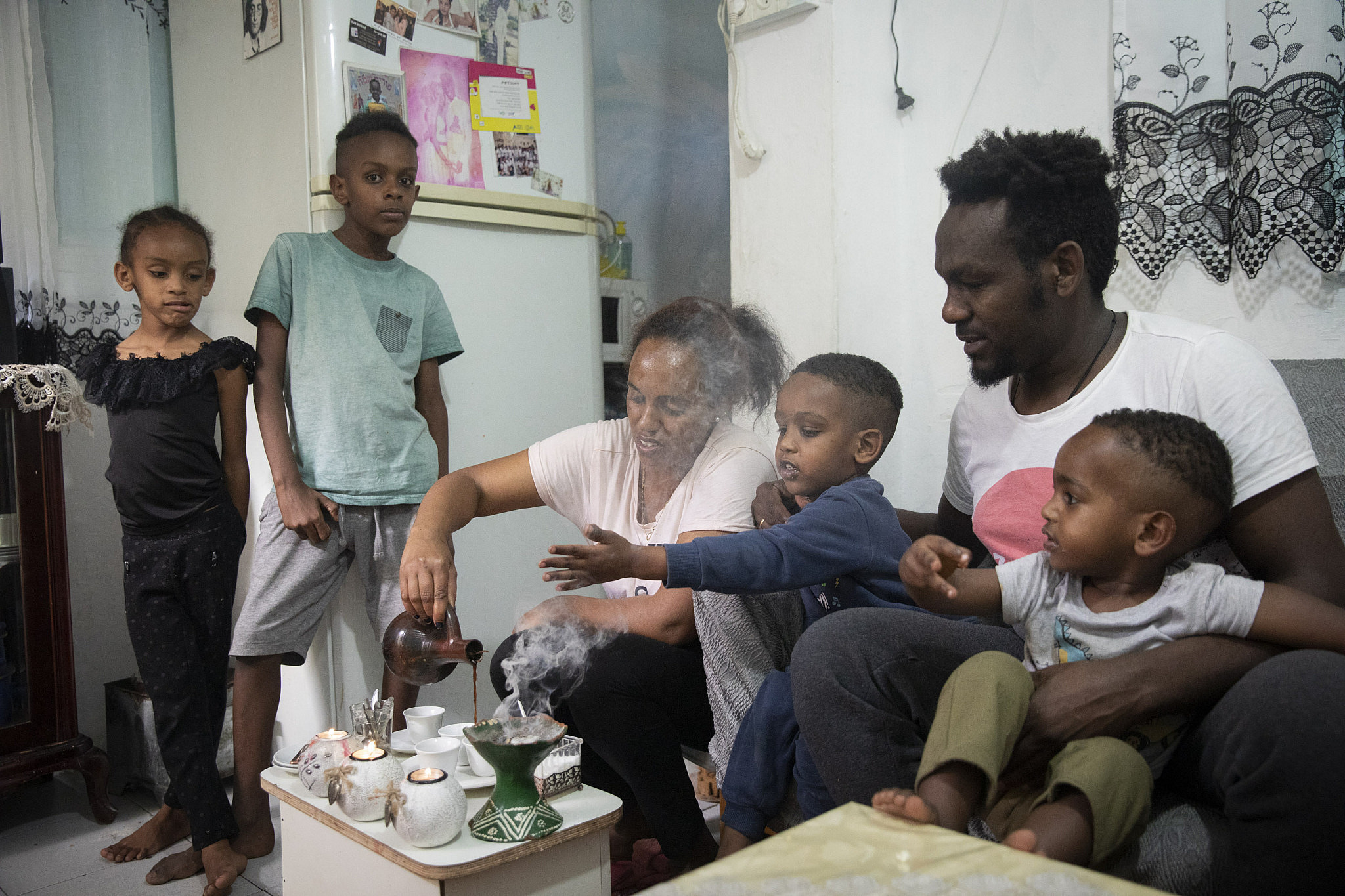
Afwerkei (33), Tsaga (31), and their children Abraham (8), Jerusalem (6), Farzagi (3), and Surrey (2) have been in Israel for 10 years. Afwerkei worked in construction and in a store, while Tsaga worked at a kindergarten, but now they are both unemployed. They live in a studio apartment in south Tel Aviv.
Afwerki: “We are happy about the court decision, but we are afraid the government will try to bypass the deposit decision. In my case, immigration (the Interior Ministry — O.Z.) told me that my boss started paying in the first few months, but then stopped. It’s hard to tell if he paid everything. I can only check the next time I go to renew my visa, because it is difficult to see in real time what is really going on with these funds.
“If I was able to work, I wouldn’t need any help and I would get along fine. Some people brought us food and the landlord gave us some discounts on the rent, but we cannot continue like this. The situation is difficult. We pay income tax and for health insurance, but when help is needed, we get nothing from the state. The deposit money will help to deal with the emergency that has fallen on us.
“This is not our country, so we need to be strong. And the truth? Asylum seekers are following the instructions more strictly than the Israelis. There are no people on the street, and when people go out shopping, they wear masks and gloves.”
‘We have no expectations from politicians’
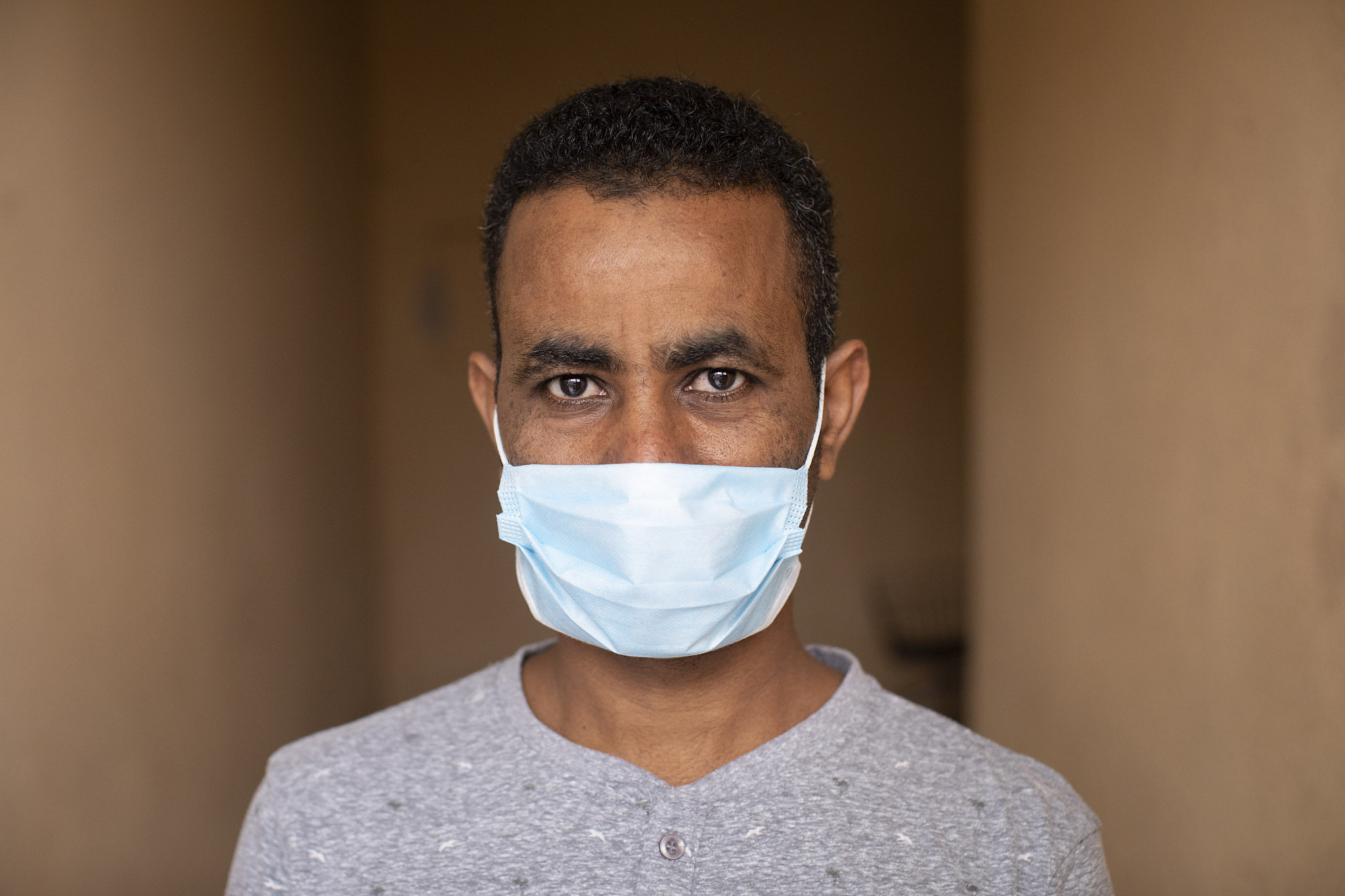
Madhani (38) is married and a father of two who has been in Israel for 13 years. He worked in the kitchen of a cafe in central Tel Aviv, and since the crisis began, his job has been on hold. His wife, who worked in a kindergarten, was also put on leave.
Madhani: “Releasing the deposit fee is a big decision, it’s really a holiday. The money that will be returned will help during this emergency. It will allow people to lend each other money and help those in the community. People are still worried that it will be a long process to release the money, and we don’t know how it will work — whether the forms will be in Arabic or in Tigrinya, and whether they can be filled out from home or not. But let’s hope for the best.
“From the beginning, we had no expectations from the politicians in Israel, only from the citizens, like during the time of deportation (the attempt to deport asylum seekers to a third state in 2018 — O.Z). Israelis turned out in the streets to protest and prevented it. Without them, we wouldn’t be here. Since the beginning of the crisis, many people have reached out and donated, and there is organizing happening in the community to support families in need of food.
“I’d like to meet the children of Miri Regev, Moshe Kahlon, and Aryeh Deri, and tell them my story. The politicians don’t talk about what’s really happening out here.”
‘I never asked for help from anyone’
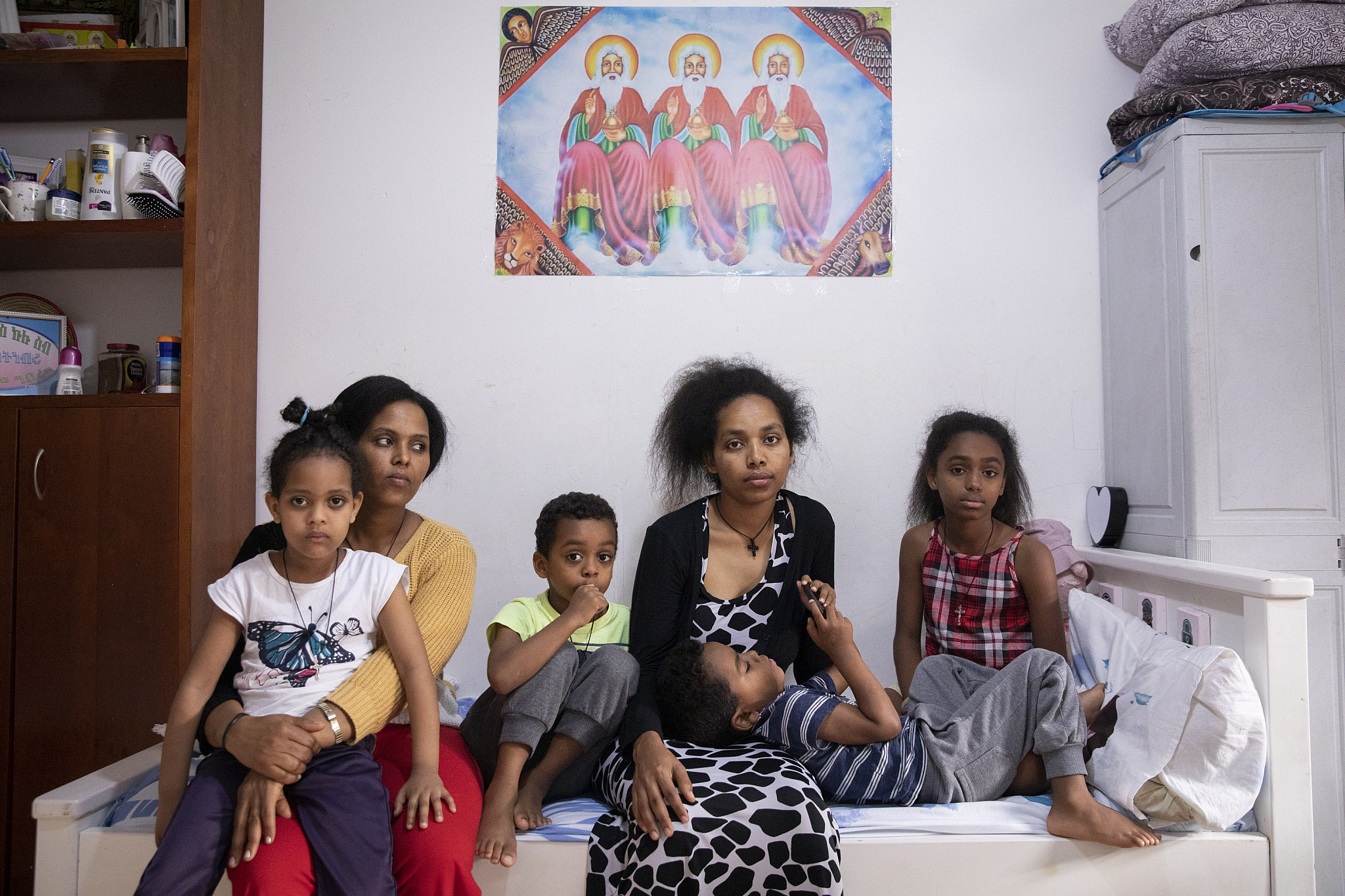
From right: Tamarza, a single mother (31) and her children Lydia (10), Hazravi (6), and Nabad (4). Left: Zahab (30), single mother, and her daughter, Jerusalem (6). Both women have been in the country for about 10 years. Tamarza worked in a food factory before the crisis and is not currently working. Zahab was unemployed before the crisis.
Tamarza and Zahab’s families moved into a one-room apartment in south Tel Aviv at the start of the crisis to share the rent, keep the children together, and share the food donations they received. They all sleep in the living room on a double mattress and a folding bed.
Tamarza: “When I was working I could get along, but now we have a month and a half with the children at home and it is very difficult. It’s stressful because it’s unclear when we will return to work. I never asked for help from anyone over the years, I worked from 7 a.m. until 6 p.m. and I took care of the children alone.”
10-year-old Lydia, who made the journey to Israel through the Sinai Desert at an early age, adds: “It’s hard for me that there is no school. Distance learning is hard because I understand less. I miss my friends. Some of their parents are working because they do essential jobs. Before the coronavirus, mom would go to work and I would wake up in the morning, dress my brothers, and take them to kindergarten and school. In the afternoon, I would pick them up and watch them until mom came home from work.”
‘I’m lucky to be left with one job’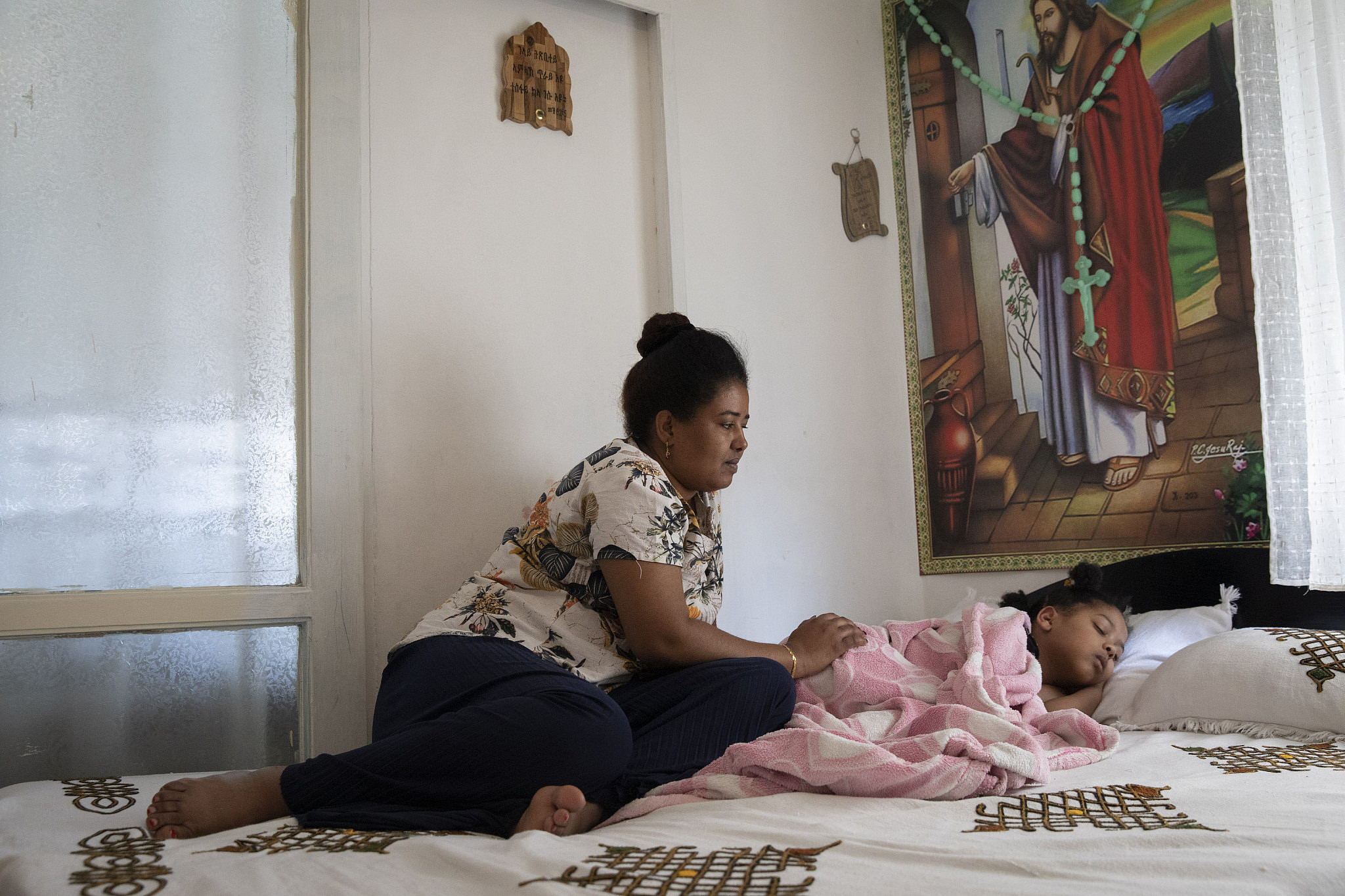
Eden (34), a single mother and her daughter Efrata (6). Not
pictured: her children Nab (16) and Sasson (13). The family lives in a
two-room apartment in Ramat Gan. Eden has been in the country for 11
years. Because of the coronavirus crisis, she lost two of her three
jobs. She works part-time at ASSAF, an aid organization for asylum
seekers in Israel.Eden: “I was glad when I heard about the deposit law, but I’m not sure how and when [the money will be released] because I don’t trust them. If it does happen, it will take a long time. Even after the decision three years ago, they only returned part of the wages (14 percent of the deposit – O.Z.). It would be really good if they do actually return it.
“The money I earn today is just enough for rent and bills. I’m lucky that out of three jobs I have one left. Other single mothers are having a harder time because they have no work at all. I bought our food for Easter with the help of my son’s school and the municipality.
“I have some savings and friends are helping, but we don’t know how long this will last. The Israelis help us, but we have no expectations of the government — even though we live here — and if we die, it is their responsibility. That’s why from the beginning we asked that they give us our money back.”
‘People could have improved their lives’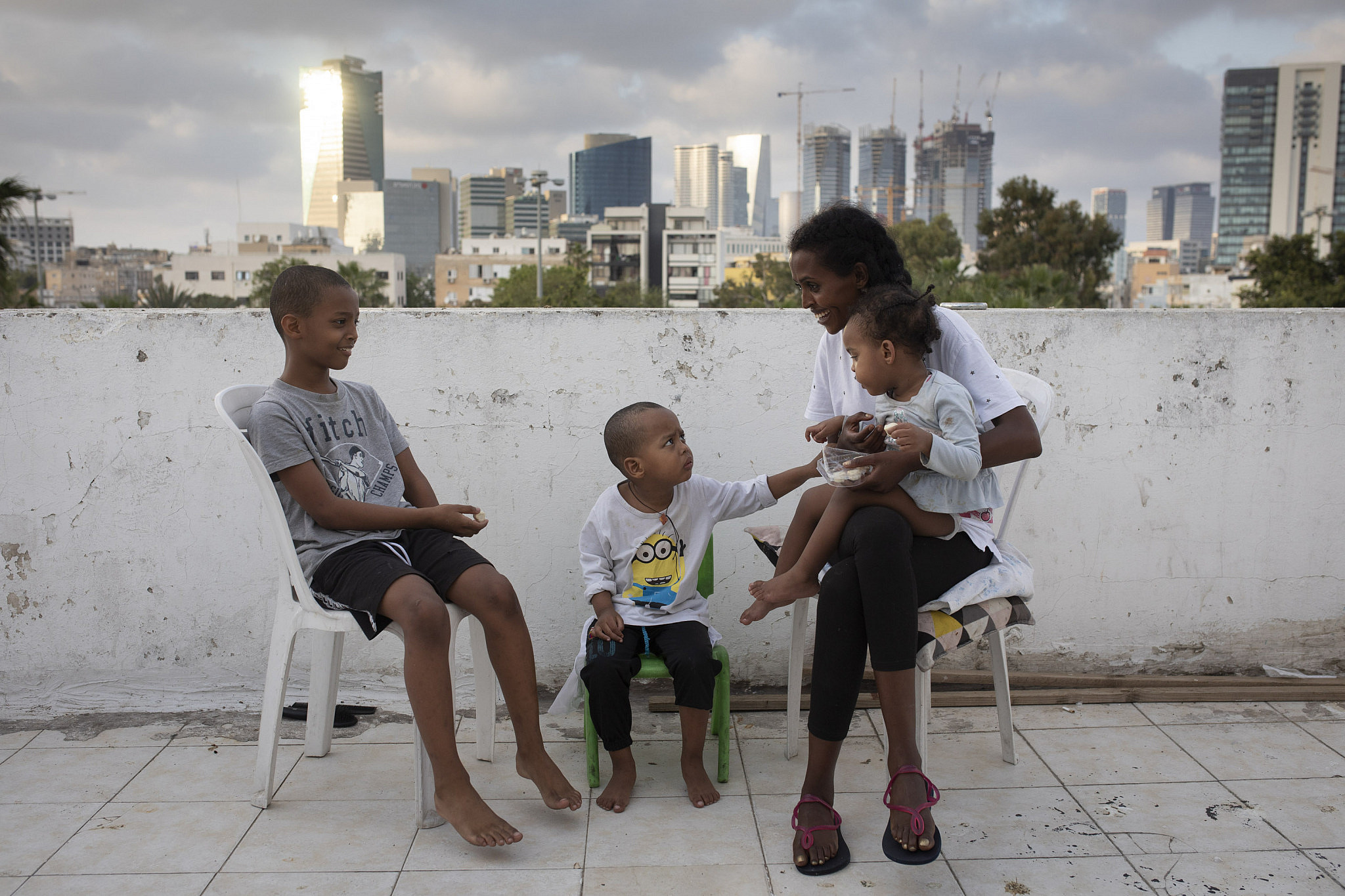
Niatt (29), a single mother, and her children Yafa (9), Osher
(4), and Morel (2), have been in the country for 13 years. The family
lives in a two-room apartment. Before the crisis, Niatt was supposed to
start working in a clothing store, but the store closed and she was left
without work.Niatt: “I have been working at informal jobs for the last decade, so I have no money in the deposit. But I am glad it will help other people in the community. If they had given us [refugee] status a short time after we arrived, people could have started their lives and improved their situation relatively quickly, and then we wouldn’t be in the position we are in today.”
‘We are afraid we won’t be treated like citizens’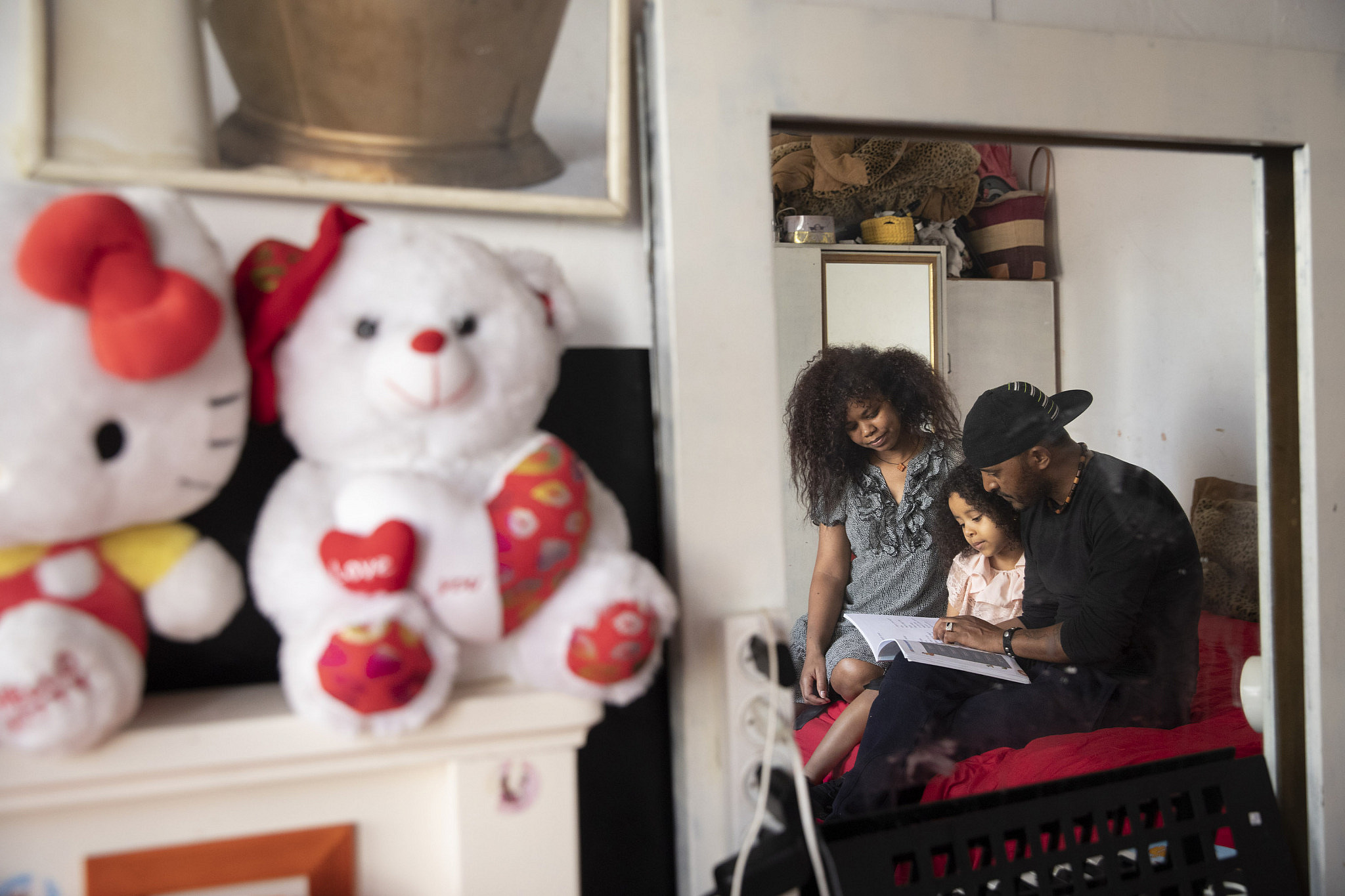
Helen (29), Samson (38), and their daughter Bet-El (6). They
have been in the country for 9 and 10 years, respectively. Prior to the
crisis, Helen worked in an office and Samson worked at a restaurant.
They both lost their jobs in early March.“From an emotional point of view, it is really stressful, and as refugees it is hard for us to understand the law. We do not have health insurance, we do not always work, and there is always the fear that we will not receive the same treatment as citizens if we fall ill. Financially, we both have no income right now. We are living off our savings and we have food to eat. But who knows what will happen in two weeks?”
‘I haven’t left the house in a month and a half’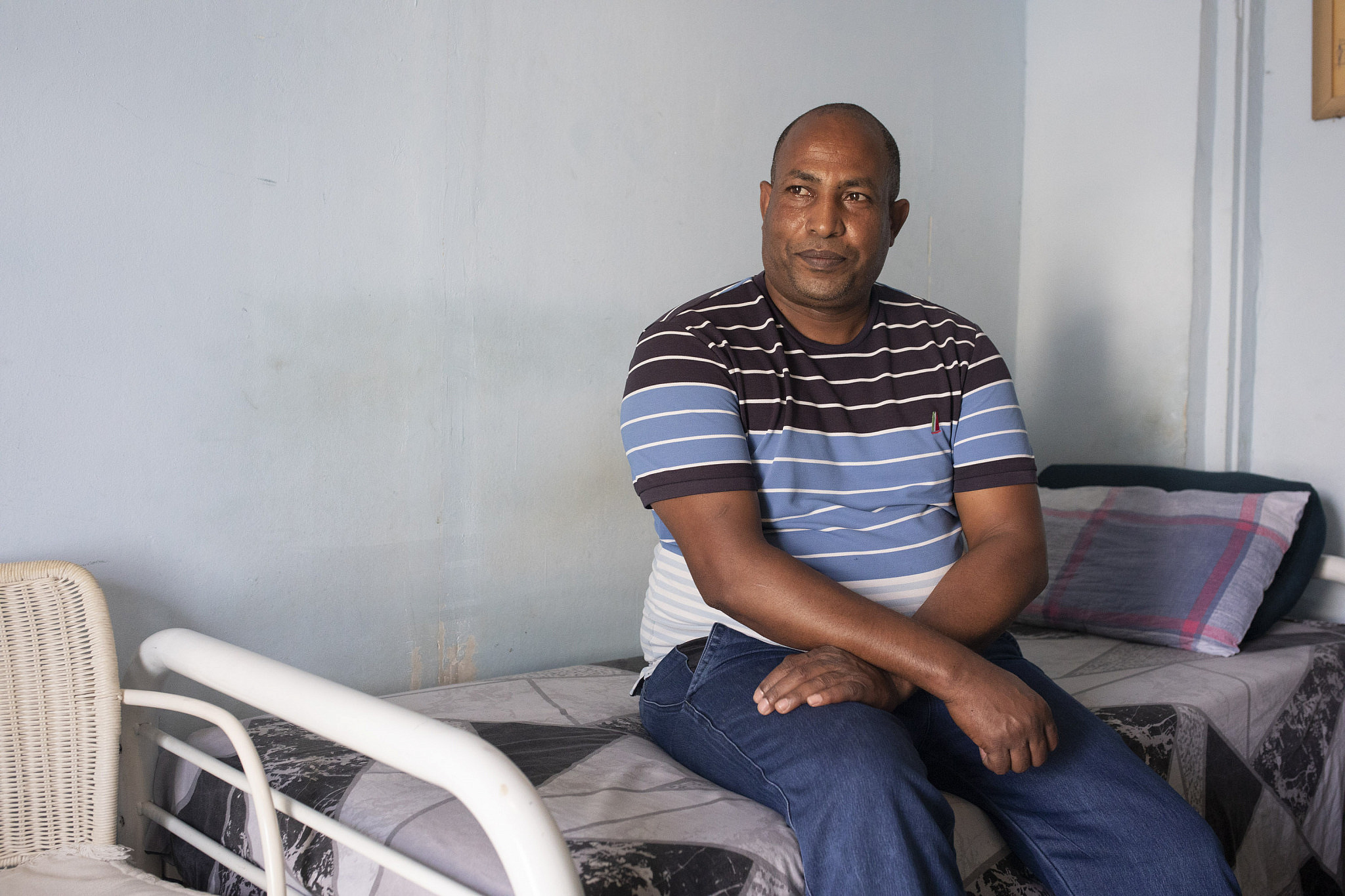
Taz (45) has been in Israel for 13 years. He lives in a tiny,
one-room apartment. He worked in a restaurant bar before the pandemic
and is now unemployed.“At first it was fine, but I’ve been home for a month and a half. I haven’t gone anywhere except out on the terrace. It’s hard for me, but I know that for families with three and four children who live in a small apartments it is even harder. I don’t know how much money I have in the deposit fund, but in any case it will help me a little, as well as many others.”
‘They won’t let us live’
Samravit (29), a single mother, and her children Eliad (9),
Natnim (7), Afilon (5), and Blessing (6 months), who is the daughter of
friends of the family and is under Samravit’s care. They have been in
the country for nine years. Samravit worked in a pre-school before the
crisis and is currently unemployed.“It’s very difficult at home. We only go out once a day to a park 100 meters from the house. We weren’t prepared for the coronavirus and we didn’t know it would come. There are many single mothers like me who, before the crisis, made a few thousand shekels and could just manage, but now it’s really hard and they just won’t let us live. It hurts me that we work, pay taxes, and get nothing back. The state should at least distribute food to the families who need it.”
‘I’m scared that my workplace won’t re-open’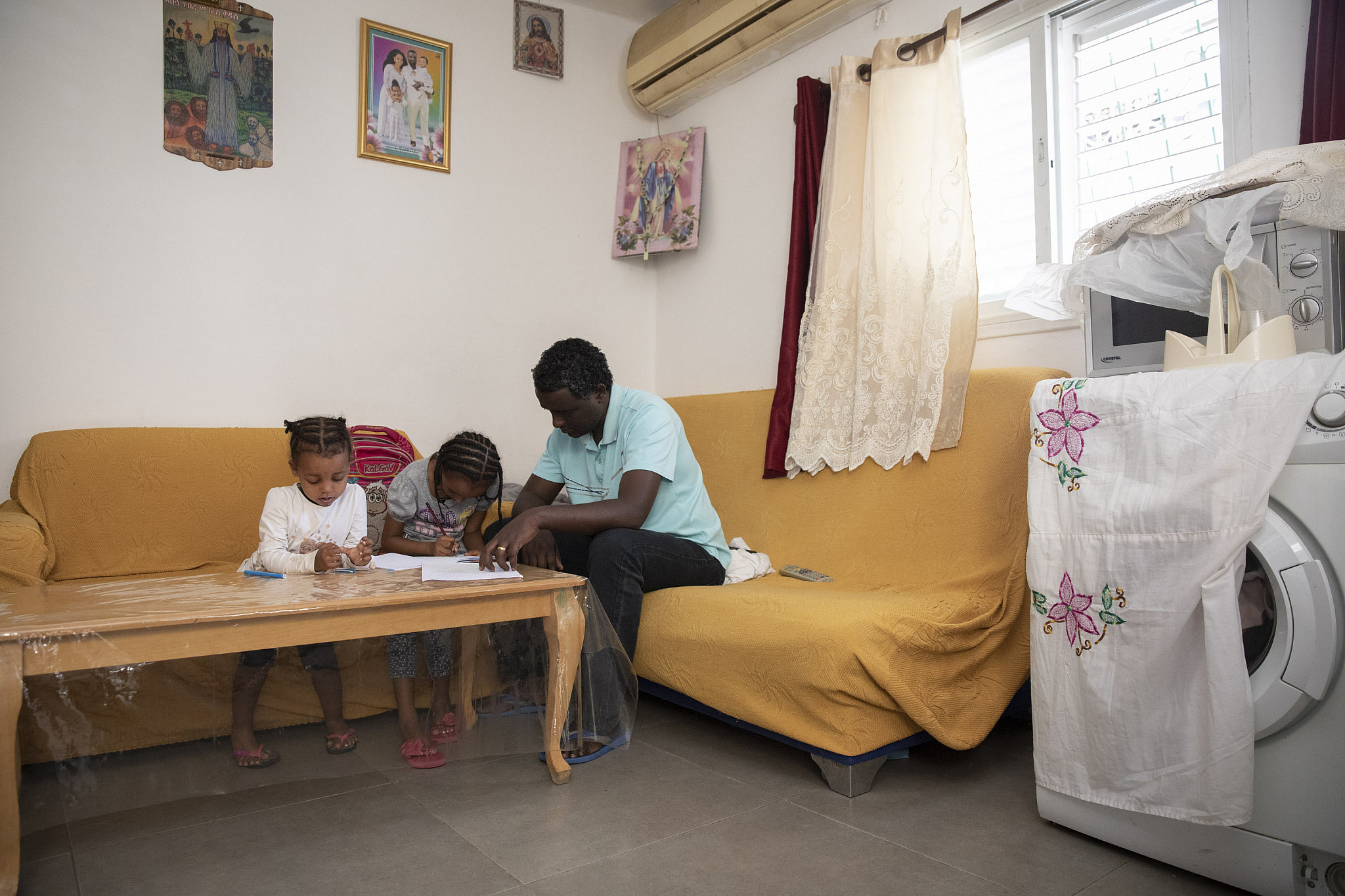
Ngassi (35) and his daughters, Orian (6) and Deborah (3). Ngassi has been in Israel for 10 years and lives in a single bedroom apartment. He lost his job at a cafe in central Tel Aviv as the crisis began. His wife continues to work as a house cleaner.
“I’ve been home for a month and a half and don’t know when I’ll be back to work. I teach the girls at home, the parents send us activities via WhatsApp. Regarding the deposit, it’s our money. Releasing it will give us air to breathe and not collapse. Even those who managed to get through this month aren’t sure what will happen next. I am afraid that even if the crisis ends, maybe the place where I was working will not recover and won’t reopen.”

